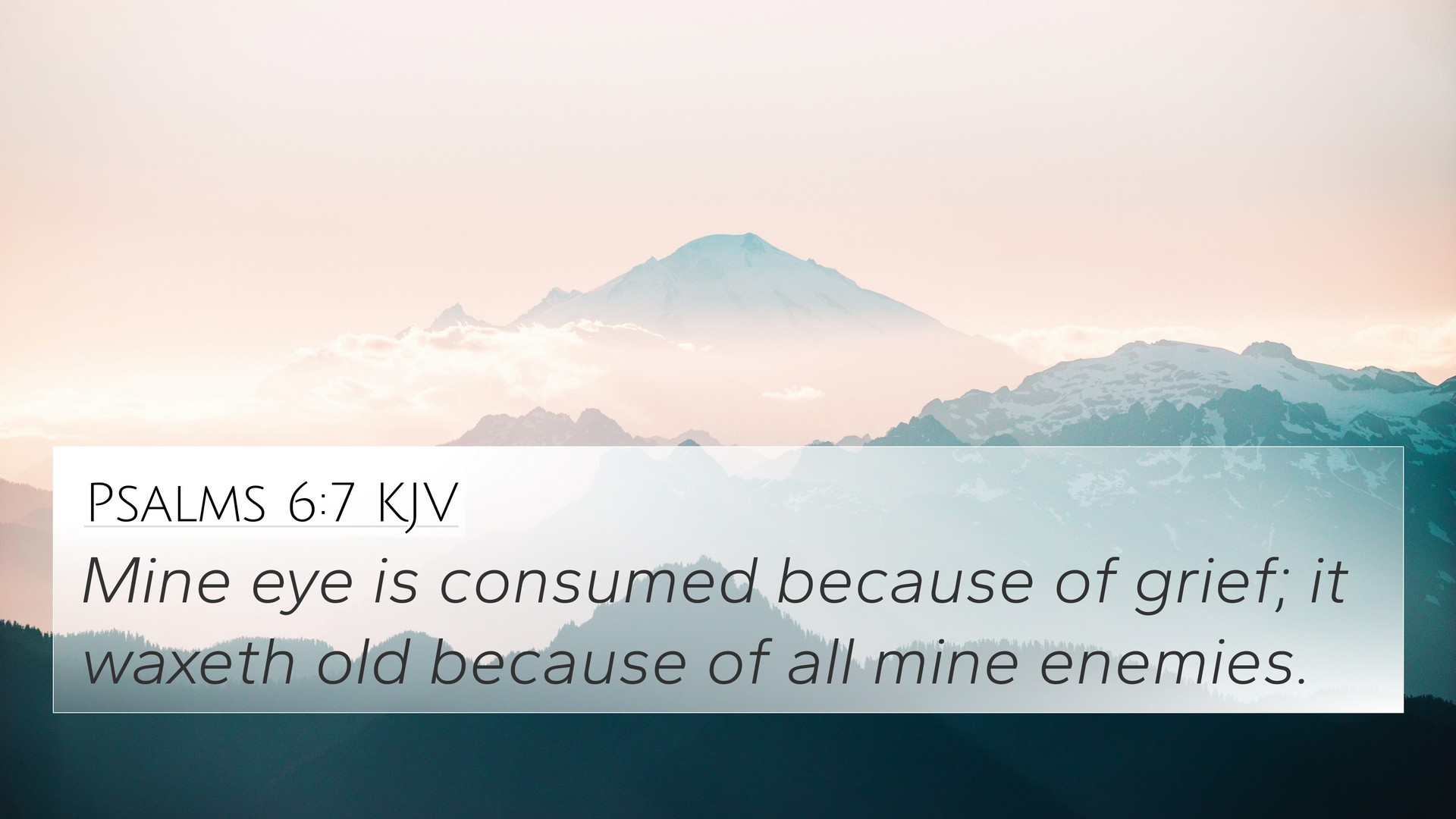Psalms 6:7 - Verse Meaning and Interpretation
Psalms 6:7 states: "Mine eye wasteth away because of grief; it waxeth old because of all mine enemies." This poignant verse reflects the deep anguish of the psalmist, who expresses his emotional pain as manifested through physical symptoms. Let's summarize key insights from public domain commentaries by Matthew Henry, Albert Barnes, and Adam Clarke, elucidating the meaning of this verse.
Summary of Insights
The psalmist's expression of grief indicates a significant emotional struggle, where his eyes are metaphorically worn out from crying. This imagery illustrates the weight of sorrow and the impact that suffering and opposition from enemies can have on a person's well-being.
Contextual Interpretation:
-
Matthew Henry: He emphasizes that the psalmist is in a state of desperation, yearning for divine intervention. The physical manifestation of grief highlights the intense emotional state caused by adversaries and struggles. Henry notes that the eyes symbolize the soul's deep distress, suggesting that prolonged sorrow can lead to a weary spirit.
-
Albert Barnes: Barnes discusses the longing for relief in this verse, indicating that the psalmist’s sorrow has drained him, causing an almost palpable despondency. He likens the experience to that of someone who has faced continuous hardship. Barnes points out that such grief not only affects the mind but can deteriorate the physical form as well.
-
Adam Clarke: Clarke points out that the phrase "mine eye wasteth away" shows a spiritual and physical toll from suffering. He interprets this as a powerful plea for God's compassion, noting that the psalmist is deeply aware of his enemies and their actions against him, leading to an overwhelming sense of pain that affects him profoundly.
Bible Cross-References
To further explore the themes of anguish and reliance on God seen in Psalms 6:7, we can refer to several related scriptures:
- Psalms 38:9: "Lord, all my desire is before thee; and my groaning is not hid from thee."
- Psalms 42:3: "My tears have been my meat day and night, while they continually say unto me, Where is thy God?"
- Psalms 31:10: "For my life is spent with grief, and my years with sighing: my strength faileth because of mine iniquity, and my bones are consumed."
- Psalms 88:3: "For my soul is full of troubles: and my life draweth nigh unto the grave."
- 2 Corinthians 1:8: "For we would not, brethren, have you ignorant of our trouble which came to us in Asia, that we were pressed out of measure, above strength, insomuch that we despaired even of life."
- Matthew 26:38: "Then saith he unto them, My soul is exceeding sorrowful, even unto death: tarry ye here, and watch with me."
- John 11:35: "Jesus wept." This shows that even Christ experienced deep sorrow.
Thematic Connections
The themes of suffering and the quest for divine solace resonate throughout the Bible. By examining cross-referenced verses, readers can identify how different scriptures articulate similar sentiments or experiences:
- Grief and Mourning: Psalms 42:3 and Psalms 38:9 echo the theme of deep sorrow, revealing how common this human experience is.
- Support in Affliction: 2 Corinthians 1:8 underscores the universal nature of struggles, showing that even apostles faced overwhelming trials.
- Jesus' Compassion: The brief yet profound verse, John 11:35, speaks to the empathy found in Christ, connecting how He understands human grief.
Conclusion
Psalms 6:7 serves as a powerful reminder of the depth of human suffering and the physical toll it can take. The insights from esteemed commentators alongside the related scriptures provide a richer understanding of how grief operates within the spiritual journey. Readers are encouraged to use tools for cross-referencing and study to uncover the thematic links among various parts of the scripture, enriching their biblical knowledge and fostering a deeper connection to the text.
Keywords for Further Study
- Bible verse cross-references
- Connections between Bible verses
- Bible verses that relate to each other
- How to find cross-references in the Bible
- Comparative study of Pauline epistles








